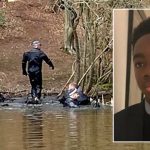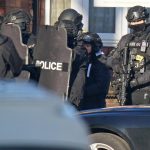Police guidance which requires “hate incidents” to be recorded – even “without any evidence of hate” – unlawfully interferes with the right to freedom of expression, the Court of Appeal has heard.
Harry Miller, a former police officer who has described himself as “gender critical”, was visited at work by an officer from Humberside Police in January 2019 over allegedly “transphobic” tweets.
A member of the public had complained about Mr Miller’s posts on social media, and the Humberside Police force recorded this as a “hate incident”.
A “hate incident” is “any non-crime incident which is perceived, by the victim or any other person, to be motivated by a hostility or prejudice”, according to College of Policing guidance.
The College of Policing describes itself as “setting standards, providing training and sharing good practice” for the police forces in the UK.
Mr Miller successfully challenged Humberside Police’s actions at the High Court last year.
The court ruled that the force’s actions were “disproportionate interference” with Mr Miller’s right to freedom of expression.
Mr Justice Julian Knowles said at the time: “The effect of the police turning up at [Mr Miller’s] place of work because of his political opinions must not be underestimated.
“To do so would be to undervalue a cardinal democratic freedom.
“In this country we have never had a Cheka, a Gestapo or a Stasi. We have never lived in an Orwellian society.”
However, Mr Miller’s challenge against the College of Policing guidance was dismissed, with the High Court saying it “serves legitimate purposes and is not disproportionate”.
Mr Miller is now challenging the College of Policing again, this time at the Royal Courts of Justice.
Speaking outside court before the new hearing, Mr Miller said: “Why we are here today is because we think it is entirely bizarre that following the guidance – as Humberside Police did – is illegal, but the guidance which they followed is legal.”
The former police officer has voiced his sympathy for constables who have to enforce the guidance.
Mr Miller’s lawyers argued the guidance – which has now been updated – “violates the right to freedom of expression”.
Ian Wise QC said the guidance pursues “the legitimate aim of preventing disorder and crime”, but in a “disproportionate manner”.
In written submissions, he said: “A policy that mandates the recording of a ‘hate incident’ without there having to be any evidence of hate is quintessentially irrational and unreasonable as a matter of common law.”
Mr Wise also argued the guidance was unclear because “the reasonable – or indeed any – reader of the guidance simply would not know whether a particular statement would be recordable under the guidance”.
Jason Coppel QC, who was representing the College of Policing, said that any interference with the right to freedom of expression was “proportionate to the legitimate aims pursued by the guidance”.
Mr Coppel added that the guidance had been “fully replaced”, and that the new guidelines included “a strong warning against police taking a disproportionate response to reports of a non-crime hate incident”, and directly referenced the High Court’s ruling.
The College of Policing’s lawyer said that “perception-based recording of the hate element of an incident” was important for officers in his written submission.
He said monitoring hate incidents “assists in the prevention of the escalation of hate-based activity” and “helps inform police action”.
Mr Coppel also argued that recording incidents on the basis of perception “avoids ‘secondary victimisation’, where a negative response given by an authority to a complaint of a hate incident results in those victims suffering further harm”.
In a statement before the hearing, Assistant Chief Constable Iain Raphael from the College of Policing said: “Our guidance is aimed at protecting people who may be targeted because of who they are.
“We know this is an area where people may be reluctant to report hate incidents to us because of the very personal nature of what they experience or perceive.
“We welcome the scrutiny of this case. Hate crime can have serious consequences and it is vital the police have the right tools to help them protect the public.”
The hearing before Dame Victoria Sharp, Lord Justice Haddon-Cave and Lady Justice Simler is set to finish on Wednesday.






















